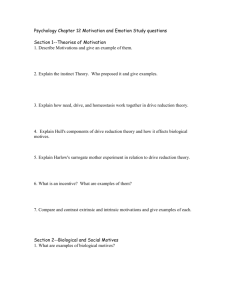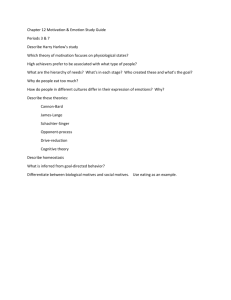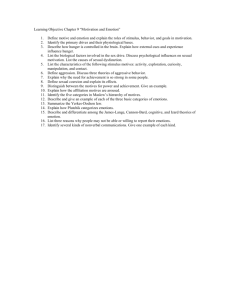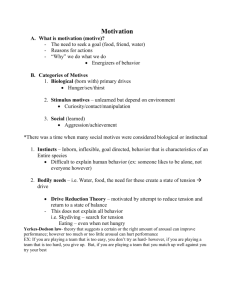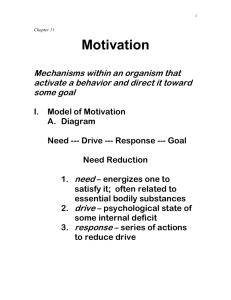Motivation and Emotion Chapter 10
advertisement
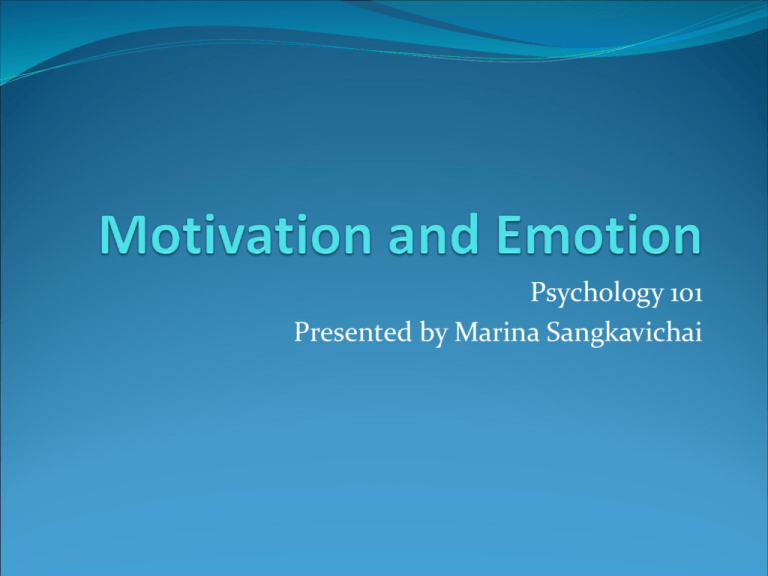
Psychology 101 Presented by Marina Sangkavichai What is Motivation? Motivation is a need or desire that energizes behavior and directs it toward a goal. It is what either starts or stops behavior. It is the internal and external forces that drive our thoughts, moods, and behaviors. What motivates you to go to college? Motivation Extrinsic Motivation: type of motivation in which a person performs an action because it leads to an outcome that is separate from or external to the person. Example: Going to work for money. Intrinsic Motivation: type of motivation in which a person performs an action because the act itself is rewarding or satisfying in some internal manner. Example: Creating a web site for fun. Different Theories on Motivation Different schools of thought look at motivation ( that power that either starts or stops behavior ) through different lenses. Instinct theory Drive Theory Incentive theory Instinct Theory Instinct theory proposes that organisms are motivated to engage in certain behaviors because of their genetic programming and because these behaviors lead to success in terms of natural selection. For example, we pursue sex in order to reproduce to propagate the human species. It is an innate biological need. Instinctual Behaviors Reproduction and social dominance Human beings are territorial “this is our space” by nature. Some animals have instinctual behaviors like mating dances and nest building sequences. Drive Theory Drive theory aka Drive Reduction or Homeostatic theory. This perspective views behavior as motivated by the need to reduce internal tension caused by unmet biological needs. This unmet need “drives” us to behave in a way that causes the intensity of the drive to be reduced. They work by “negative” feedback, that is one experiences an unpleasant feeling (hunger, thirst) until you meet the need. Drive Theory Continued The brain makes sure the body is kept in balance ( body temperature, fluid levels, energy supplies, need for rest ). This balance or optimal state is called homeostasis. This is our natural state. The body does its best to stay balanced.( hunger, thirst, sex drive, sleep ) However, how do we account for eating disorders? Incentive Theory Incentive theory states that behavior is motivated by the pull of external (outside ) goals such as rewards. You come to class to get an A You work out to get compliments You go to work to earn money to buy a house Are all human behaviors motivated by incentives? What do you think? Incentive Theory Not all of human behavior has a direct reward attached to it. For example, how about those who are motivated to achieve just for the sake of achieving or who do things for fun or personal growth. What are some of the things we do for fun that don’t have any incentive attached to them? Types of Motives Motives can be divided into three major categories Primary Motives Stimulus Motives Secondary Motives Types of Motives in Detail Primary Motives are based on biological needs that must be met for survival. They are innate like hunger, thirst , pain avoidance, needs for air, sleep, elimination of wastes, and regulation of body temperature. Motives in Detail Stimulus motives: express our needs for stimulation and information. For example, activity, curiosity, exploration, throwing parties, surf the net, reading, hanging out with friends, emailing each other. Imagine what your life would be like if you felt no arousal? No stress? BORING! Motives in Detail Secondary motives: based on learned needs, drives, and goals. Helps explain many human activities like making music, creating a web page, trying to win a skateboarding contest or American Idol. These motives are related to learned needs for POWER, AFFILIATION,(the need to be with others ), approval, status, security, and achievement. Motives Primary Motives ( like satisfying hunger) Stimulus Motives ( like learning computers or dancing for fun ) Secondary motives ( motivated to do something for fame, power, approval status) What motives do these activities belong to? Reading history for pleasure Hunger Trying out for American Idol. Proof of Stimulus Needs Monkeys playing for stimulation Sensation Seekers Sensation seeking is a trait of people who prefer high levels of stimulation. Whether you are high or low in sensation seeking is probably based on how your body responds to new, unusual, or intense stimulation. People who score high on sensation seeking tend to be independent, bold, who value change. They report more sexual partners than low scorers, always “looking for thrills.” Psychology Question Please write a one page mission statement for your life. What motivates you? What gives your life meaning and purpose? What do you hope to accomplish with the time that’s been given to you? Sensation Seekers Low sensation seekers are orderly, nuturant, giving, and enjoy company of others. Which are you? Most people are some where in the middle of these two extremes. Need for Achievement Need for Achievement Motivation Motivation is a habitual desire to achieve goals through ones efforts. The desire to excel or meet some internalized standard of excellence People want to do well in any situation Story David Mandel (1983) a former Nazi concentration camp inmate, recalled how a starving “father and son would fight over a piece of bread like dogs.” One father, whose 20 year old son stole his bread from under his pillow while he slept, went into a deep depression, asking over and over again how his son could do such a thing. The next day the father died. “Hunger does something to you that’s hard to describe.” Mandel explained. Abraham Maslow Hierarchy of Needs Abraham Maslow believed that people strive for a positive view of the self to realize their own potentials fully. Believed these needs were innate but without a supportive, nurturing environment, this essential striving for full potential could not take place. In other words, he believed we all strive to work at our fullest potential. We all want to become “self actualized” that is reaching and using our full potential in our vocational and personal life. The Rose That Grew From Concrete Abraham Maslow He believed a person must satisfy the needs at the lower levels before moving on to tackle the ones at the top. For example, if you don’t have enough to eat, or scared you may lose your house, you probably won’t strive as much for personal accomplishment. This is very difficult to test. Also some of the most creative people have lived in poverty. Edgar Allen Poe for example Emotions Emotion is defined as a state characterized by physiological arousal, changes in facial expression, gestures, posture and subjective feelings. An example of physiological changes ( or arousal ) are a pounding heart, sweating palms, “butterflies in the stomach”, and other bodily reactions. Eight Primary Emotions Fear Surprise Sadness Disgust Anger Anticipation Happy Trust Lie Detectors Do lie detectors work? Lie detectors are called polygraphs. They record changes in physiological arousal. It’s not really a lie detector because critics say there is no “lie response.” It records general emotional arousal-it can’t tell the difference between lying and fear, anxiety, or excitement. Lie Detectors Some people can lie without anxiety. David Lyken (1998) has documented many cases in which innocent people were jailed after being convicted on the basis of a polygraph evidence. Facial Expressions Basic expressions seem to be fairly universal Children who are born blind express emotions the same way sighted people do Facial Feedback Hypothesis The Facial Feedback Hypothesis states that facial expressions can actually cause emotion! Changes in heart rate and skin temperature Smiling when your down may help improve mood but its important to deal with your emotions constructively
